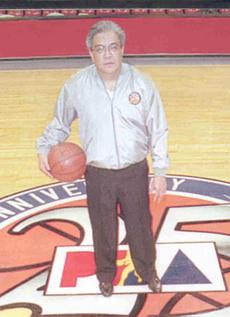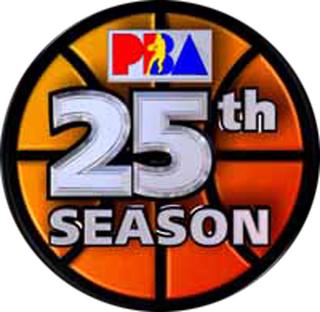
The Philippine Basketball Association (PBA) is a men's professional basketball league in the Philippines composed of twelve company-branded franchised teams. Founded in 1975, it is the first professional basketball league in Asia and is the second oldest continuously professional basketball league existing in the world after the NBA, established before the "open era" of basketball in 1990 where FIBA allowed longstanding domestic leagues, which mostly had predated the PBA, to become professional. The league's regulations are a hybrid of rules from the NBA and FIBA.

The Tanduay Rhum Makers (1975-1987) and Tanduay Rhum Masters (1999-2001) were two basketball franchises associated with the same liquor brand that played in the Philippine Basketball Association (PBA).

Eric Conrad Menk is a Filipino-American former professional basketball player who played in the Philippine Basketball Association (PBA) and the Asean Basketball League. Known as Major Pain, Menk is a four-time PBA champion and was the 2004–05 PBA Most Valuable Player.

Emilio "Jun" Bernardino, Jr. was the fifth commissioner of the Philippine Basketball Association (PBA). He was elected as commissioner of the league in 1994 and retired in 2002. He served as the commissioner of the Shakey's V-League and of the 2006-07 season of the National Collegiate Athletic Association (Philippines).

The 1999 PBA season was the 25th season of the Philippine Basketball Association (PBA).

The 2000 PBA season was the 26th season of the Philippine Basketball Association (PBA).
The Philippine Basketball Association draft is an annual event dating back to 1985 in which the twelve teams from the Philippine Basketball Association (PBA) can draft players who are eligible and wish to join the league. The draft usually takes place between October to December, during the league's off-season. No player may sign with the PBA until he has been eligible for at least one draft. However, foreign player-nationals of Filipino descent are ineligible for both the draft and the league if they are aged 31 years and up.

Alfrancis P. Chua is a Filipino sports executive and former basketball player and coach. He is currently the team manager of Barangay Ginebra San Miguel and the sports director of San Miguel Corporation (SMC), overseeing the professional sports teams of the SMC group.

Rudolph Conse "Rudy" Hatfield II is an American-Filipino retired professional basketball player who played for Laguna Lakers in the Metropolitan Basketball Association and for Tanduay Rhum Masters, Pop Cola Panthers, Coca-Cola Tigers and Barangay Ginebra San Miguel in the Philippine Basketball Association.
Arturo F. Valenzona, also known as Turo Valenzona, is a former Filipino basketball player and head coach.
The 2000 PBA All-Filipino Cup or known as the 2000 Alaxan PBA All-Filipino Cup for sponsorship reasons, was the first conference of the 2000 PBA season. It started on February 20 and ended on June 11, 2000. The tournament is an All-Filipino format, which doesn't require an import or a pure-foreign player for each team.
The 1999 Tanduay Gold Rhum Masters season was the first season of the new franchise in the Philippine Basketball Association (PBA).
The 2000 Purefoods Tender Juicy Hotdogs season was the 13th season of the franchise in the Philippine Basketball Association (PBA).
The 2000 Tanduay Rhum Masters season was the 2nd season of the franchise in the Philippine Basketball Association (PBA).
The 1999 McDonald's PBA All-Filipino Cup Finals was the best-of-7 basketball championship series of the 1999 PBA All-Filipino Cup, and the conclusion of the conference playoffs. The Formula Shell Zoom Masters and Tanduay Rhum Masters played for the 72nd championship contested by the league.
Domingo Yulo Itchon (1924–2004) was a Filipino business executive and best known as the second president of the Philippine Basketball Association (PBA). Itchon played a key role in organizing the PBA, Asia's first professional basketball league.

The Maharlika Pilipinas Basketball League (MPBL) is a men's professional basketball league in the Philippines.

The Tanduay Rum Masters are a basketball team which currently competes in the Filbasket. It is affiliated with Tanduay Distillers.

The 2021 PBA season is the 46th season of the Philippine Basketball Association. Due to the COVID-19 pandemic, the season's start, originally scheduled on April 11, 2021, has been delayed until July 16, 2021. The league's Board of Governors announced that the season will have two conferences: the Philippine Cup and the Governors' Cup.
Foreign players, also referred to as international players or imports, have taken part in various national or domestic sports leagues across the world. Some leagues impose player quotas to limit the number of foreigners on a team. A player may be considered as foreign depending on various factors not limited to their citizenship; such as their heritage, birthplace or residency.










